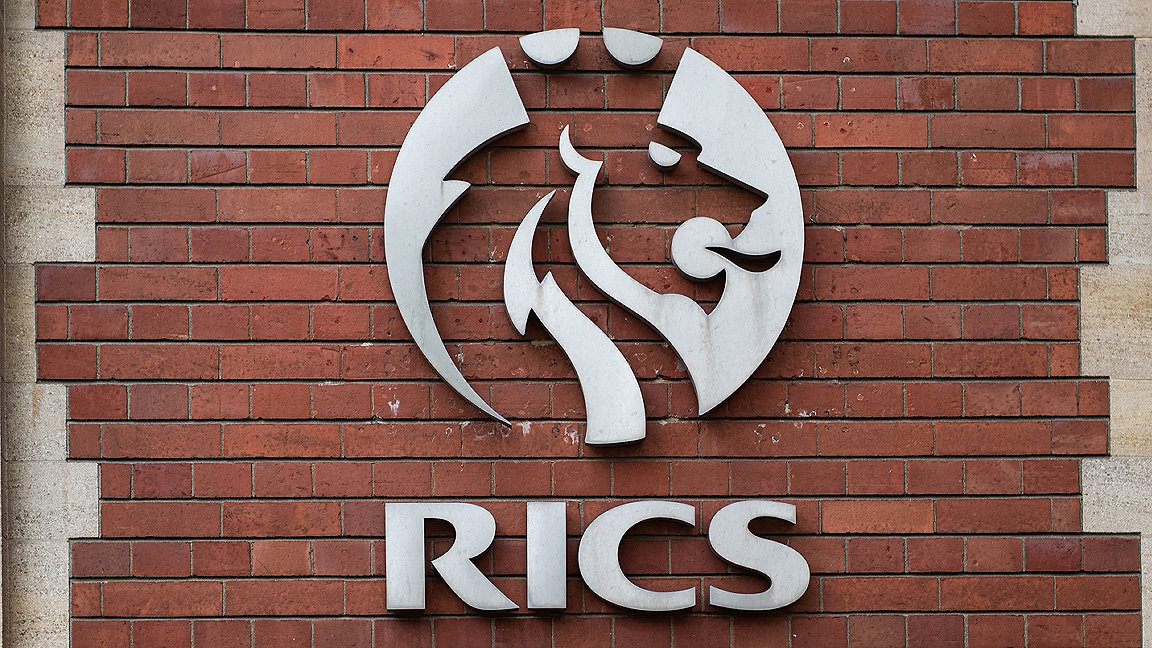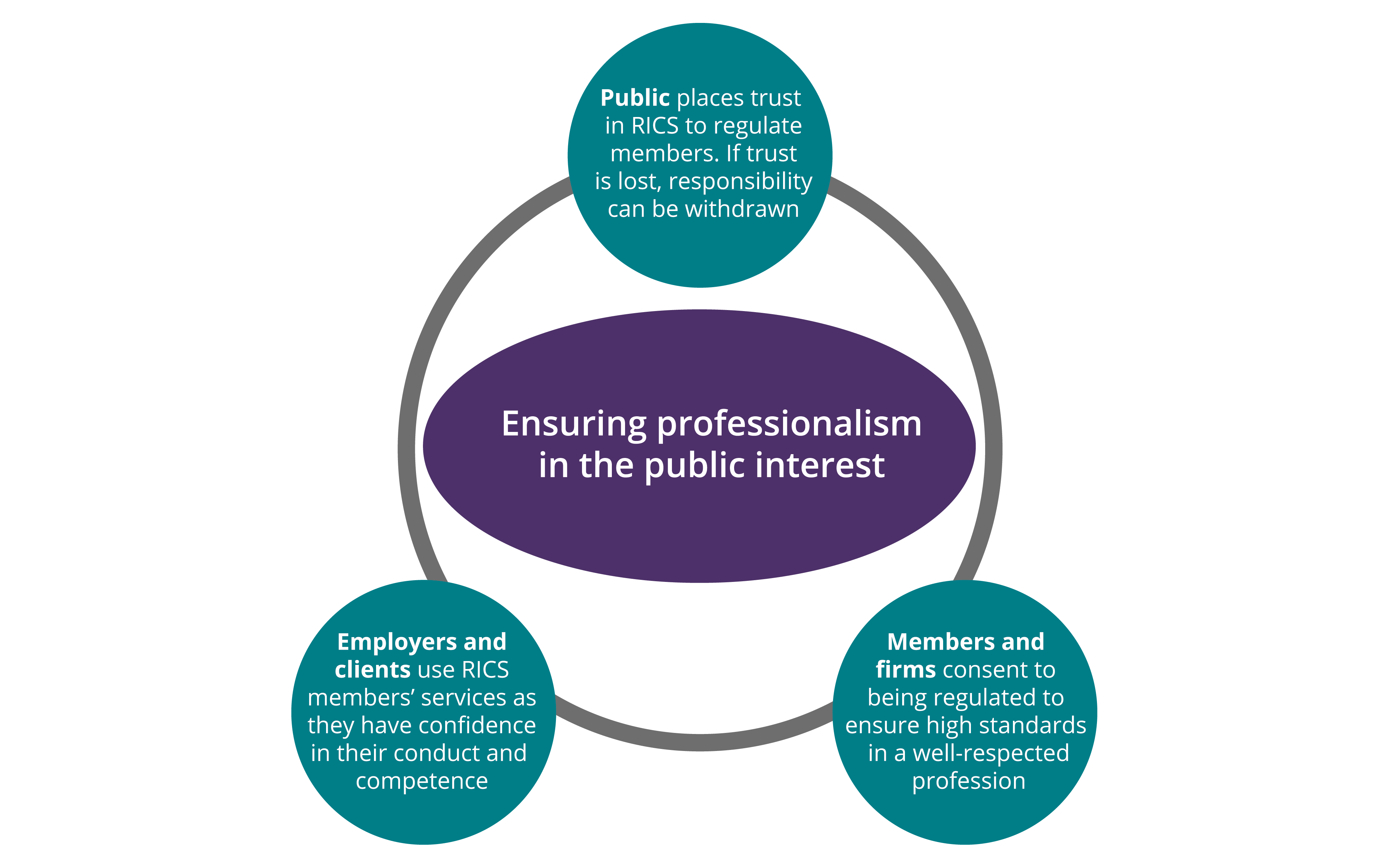
The trust that clients, employers, professionals and the public place in RICS members is underpinned by our regulatory function. In effect, regulation plays an integral part in upholding RICS' reputation.
As part of this function, we investigate cases where we may need to take disciplinary action in the public interest, to maintain professional standards and retain public trust and confidence (see Figure 1).
We look into concerns shared with us about surveyors working in any field – including residential property management – and there are occasions where we require independent experts in a sector to provide their professional opinion on a specific issue.

We are now recruiting an eight-strong panel of experts with extensive knowledge in residential property management who can provide independent specialist opinion to support our investigatory, disciplinary and enforcement activities.
This may include informal advice to help investigators understand complex technical information, formal opinion such as expert reports, or oral evidence at disciplinary panel hearings.
An infrastructure for investigation
There are 28 permanent RICS staff in the investigations team, and they are predominately based in the UK. The team is responsible for investigating concerns about regulated members and firms, to establish whether they have breached the RICS Rules of Conduct, bye-laws or professional standards.
In some of these cases, they determine whether disciplinary proceedings are necessary to protect the public interest. It is also this team who, where necessary, seek independent opinion from the panel of sector-specific experts.
The investigations team is part of the wider regulation function, which comprises around 100 dedicated staff. We are responsible for regulating more than 10,400 RICS-registered firms and almost 136,000 individual professionals and trainees worldwide.
To give an idea of the scope of our work, the regulation team received 2,697 concerns about members or firms in 2020–21; of these 411 led to investigations, 355 of which were concluded with no further action after investigation. At any one time, the team is actively investigating around 350 cases.
The investigations team manages this work with the support of lawyers from the enforcement team, as well as expertise from the profession support and assurance team. The most serious cases are referred to the enforcement team, who are responsible for presenting these to the Regulatory Tribunal.
'We are responsible for regulating more than 10,400 RICS-registered firms and almost 136,000 individual professionals and trainees worldwide'
Weighing up the evidence
Regulatory strategy, policy and activities are overseen by the independently led Standards and Regulation Board (SRB). Clear processes and decision-making frameworks developed by the regulation team are followed by investigators to ensure a consistent approach in all cases.
When RICS receives concerns about the behaviour or competence of a member or regulated firm, these are dealt with in accordance with the current version of Regulatory decision-making guidance.
The factors considered include:
-
whether the individual subject of concern is an RICS member or regulated firm
-
the seriousness of what has been reported
-
the evidence provided
-
whether the information is from a credible source
-
the regulatory and disciplinary history of the member or regulated firm
-
whether a pattern of similar concerns has been raised.
Not all concerns brought to the attention of the regulation team therefore fall within its remit – which is why, for instance, only 15% of concerns warranted investigation in 2020–21.
However, any information we are given can be referred to a more appropriate body; this could be the firm's or member's chosen alternative dispute resolution service, the First-tier Tribunal, or another professional regulatory body. Alternatively, we can direct those who raise concerns to other sources of support or further advice.
When a case is referred to the investigations team, though, it will consider the concerns raised about the member or firm, make relevant enquiries, and seek further evidence to establish whether there has been a breach of RICS' rules, bye-laws or professional standards.
This is when an independent expert opinion may be needed, whether from a chartered surveyor or other appropriate professional. The investigator makes contact with the expert and – subject to confirmation that there is no conflict of interest – they are appointed to provide their independent opinion on whether they think there has been a breach of RICS' rules or professional standards.
Documentation relevant to the investigation is sent to the expert to review, and they provide their written opinion on it. Once RICS receives this, we send a copy of their opinion to the member or firm under investigation for an explanation or response.
Proceeding to disciplinary action
If the investigations team decides there is sufficient evidence for 'a realistic prospect of establishing liability to disciplinary action', to quote the guidance, it will refer the matter to the head of regulation. It is they who determine whether to commence proceedings.
They may decide to:
-
take no further action and close the case, which may also involve advising the member or firm about future conduct
-
request further investigation
-
agree a Regulatory Compliance Order with the member, in which the member commits to rectifying a particular risk by, for instance, attending a course to improve their knowledge in a specific area
-
refer the case to the Regulatory Tribunal or a tribunal member for consideration and determination; the tribunal consists of RICS members and independent appointments, distinct from the experts whose opinions are sought during investigations.
Being separate from RICS and its regulatory operations, the tribunal provides the profession with an effective, fair and independent judicial body.
How the best candidates can enhance our process
To maintain the rigour of the regulatory process, candidates will need to demonstrate a range of qualities.
Applicants should preferably be at least associate members of RICS; full membership or fellowship is preferred, unless candidates can demonstrate substantive knowledge in their area of expertise. They also require a minimum of five years' experience in residential property management after graduation, and should have appeared as an expert witness in any one of the following:
-
First-tier Tribunal
-
Upper Tribunal (Lands Chamber)
-
a county court
-
the High Court.
Candidates must also be intellectually flexible, resilient, confident and professional. They will have an unimpeachable reputation for probity, integrity and fairness, and must be able to form a constructive, independent and rationalised view using sound judgement, based on the RICS Rules of Conduct, bye-laws and professional standards.
If this sounds an interesting use of your professional expertise, RICS would very much like to hear from you. In turn, should you be appointed to the panel, you would have the opportunity to:
-
diversify and use your professional experience and knowledge in a different way
-
be a trusted, credible and independent expert adviser on regulatory and disciplinary matters
-
be remunerated for your expert opinion and advice
-
receive professional development training.
The maximum time commitment anticipated for this role is six days a year, over which you would likely be instructed on no more than three cases.
RICS particularly welcomes applications from women, LGBTQ+ people, people with disabilities, and people from ethnic minority communities. We encourage qualified candidates from a wide array of backgrounds to apply because we know that it's the difference in our people that makes a difference in our performance.
'To maintain the rigour of the regulatory process, candidates will need to demonstrate a range of qualities'
How to apply
If you are interested in this opportunity and think you can offer what we are looking for, please contact us, sending your CV and a single-page cover letter that details how you fulfil the required areas of experience and knowledge, by 17:00 (GMT) on Monday 13 March 2023. For further details, see the full job advertisement.
Interviews will be held either in person in our offices in Birmingham or via conference facility. We will be in touch with you to make arrangements should you be shortlisted to the next stage of the process.
